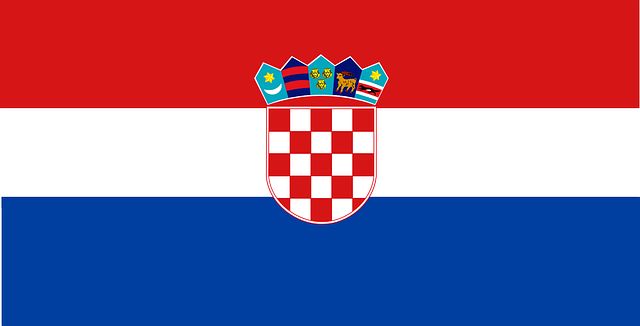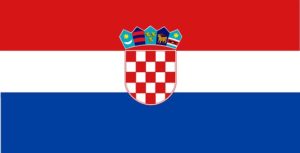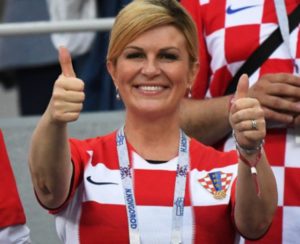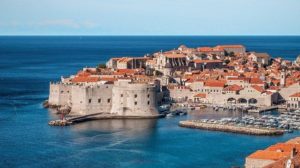Lesser-Known Facts About Croatia | Historical Facts About Croatia

- By
- Aparna Patel
- |
- 4 Dec, 2019
- |

Are you looking for lesser-known facts about Croatia? Here is a collection of interesting and fun facts about Croatia which You’ve Never Heard Before as well as you can also read general information about Croatia such as culture, and historyetc.

Croatia is a country in southeastern Europe. Croatia is one of the richest countries of the Balkan Peninsula and the former Yugoslavia. Croatia is located in Central and Southeast Europe. The Adriatic Sea is its southwestern border. Croatia also borders Hungary, Serbia, Bosnia and Herzegovina, Montenegro and Slovenia.
Table of Contents
General facts about Croatia
- Total Population – 4.08 Million (40.8 lakhs)(2019)
- Highest Mountain – Dinara 1,500 metres (4,900 ft)
- Total Area – 56,594 km²
- Largest Lake –Vrana
- National Day – 8 October
- Currency – Croatian kuna
- National Song – “Lijepa naša”
- Capital – Zagreb
This country became independent in 1991 after the start of the Football World Cup. Croatia reached the semi-finals in the first attempt in 1998 after becoming independent. Today, we are telling you some interesting information about Croatia itself.
Amazing Facts About Croatia For Tourists and Kids
1. You might be surprised to know that Croatia is the 127th largest country in the world. Its highest place is the Dinara peak at 1,831 meters.
Thousands of islands are part of Croatia. The largest islands are Cres. The major rivers are the Sava, Drava, Kupa, and Danube. Croatia has many deep caves. The most famous lakes in Croatia are Lake Plitvice.
2. Croatia has reached the final of the Football World Cup after defeating England in 2018. It is the smallest country to reach the final after Uruguay with a population of only 4 million.
3. Where is Croatia?
- Croatia is a small country located between the Pannonian Plain and the Mediterranean Sea in Southeast Europe ie Balkans. The south and west sides of the country meet the Adriatic Sea. There are about a thousand islands, big and small along the Adriatic Sea. Therefore, there has been a lot of scope for tourism.
- Hungary, Slovenia, Serbia, and Bosnia-Herzegovina are neighboring countries. It is spread over 56 thousand square kilometers i.e. equal to Himachal Pradesh. Most people in this country are Roman Catholics.
4. Two and a half times more tourists than the population
- Tourism is a major contributor to Croatia’s economy. Tourism accounts for 20% of the country’s GDP. Croatia attracts more than 10 million tourists every year i.e. more than two and a half times the population there. It earns 8 billion Euros every year from tourists only.
- Apart from this, the export units of Sea Food and Organic Food also run the economy of Croatia.
- In Croatia, 70 percent of the people work in the service sector. Thus, the service sector also a large source for its economy.
5. Zagreb capital and most prominent city
It is also the largest city in Croatia with a population of about 800000. That is, every fifth person in Croatia lives in Zagreb. The entire city is spread over an area of about 600 sq km.
6. Croatia was once part of Yugoslavia
- Before 1991, Croatia was part of Yugoslavia. On 25 June 1991, it announced its separation from Yugoslavia. However, Yugoslavia did not approve it. For this reason, the Army of Yugoslavia caused massive oppression there. Thousands of Croatians were killed.At least 170000 Croatian citizens had to flee home to escape persecution.
- In January 1992, Croatia was recognized by the European Economic Community and subsequently by the United Nations. Finally, in 1995, Croatia’s army defeated Yugoslavia’s army and became an independent country.
7. Amazing History
The history of Croatia is quite old. In the year 925 AD, Croatia became the state and Tomislav became its first ruler.
It made considerable progress during the rule of King Petar Kresimir IV. In the year 1102, Croatia was merged into Hungary through the Pacta Agreement.
In the year 1918, Croatia announced its separation from Hungary and joined Yugoslavia. During the Second World War, the Nazis occupied the territory of Croatia and established the independent state of Croatia.
After the war ended Croatia again joined Yugoslavia as a founding member. The disintegration of the Soviet Union also led to a scatter in Yugoslavia. As a result, on 25 June 1991, Croatia became an independent country.
8. Siege of Sarajevo
The siege of the city of Sarajevo in the Bosnia War called the Seas of Sarajevo, became very famous. Bosnian Serbs surrounded the city for 4 years and opened fire day and night. Every visible person was killed, but even after so many atrocities, he could not win the city and finally after 4 years the siege had to be ended without any decision.
9. Football in Croatia
- Croatia played the FIFA World Cup for the first time in 1998 after becoming independent in 1991.
- In his first FIFA World Cup, he made history by reaching the semi-finals. But in the subsequent three World Cups, he was eliminated in the group stage.
- The reason why football is so ahead in Croatia is that it has maintained the academy system of Yugoslavia even after independence. There are more than 1500 football clubs in this small country which has 130000 registered football players.
Croatia made its mark in the 1998 World Cup in France.
Croatia defeated Jamaica, Japan, Romania, and Germany and entered in the semi-finals where they faced France.
France beat him 2–1 due to Lillian Thuram’s magic
10. Sports lovers
The people of Croatia are sports lovers. His handball team has won the Olympic champion’s gold twice as well as gold in the Olympics twice. His water polo team is also the world champion.Not only this, top basketball player Drazen Petrovic, Tennis legend Goran Ivanisevic, Marin Klick are also from Croatia. Croatia’s Blanca Valacic has also been the high jump champion, which means Croatia has a good record in all types of sports.
11. According to the figures in 2016, its population was about 4 million. It is ranked 125 in the world by population. The life expectancy of the people here is 78.20 years.
Croats, the highest number of 90.4 percent, are Serbs followed by 4.4 percent, followed by Bosniaks, Hungarians, Italians, Germans, Czechs, Romans, etc. Croatia was the territory of a duke in the seventh century and in the 10th century, it turned into a monarchy.
Croatia is ranked 45 in the Human Development Index, which would be considered very good and the per capita income is around $ 12364.
12. If you are fond of smoking then you will not like this fact, Croatia is one of the countries where smoking is prohibited.
13. Croatia is the country after Norway where the maximum tax is collected from the people.
14. Croatia is known for its traditional fishing culture. But here 90 percent of the fish are not eaten but are sold in many countries of Europe.
15. Famous Tourist destination
Tourism is the main source of Croatia’s GDP. There are close to a thousand island groups that attract tourists. Apart from that, the mountain range and the national park also attract people.
16. The founder of the Tesla company, Nikola Tesla, was born in Smiljan, a village in Croatia.
17. The Krapina Neanderthal Museum covers an area of approximately 1,200 square meters and is one of the most modern museums in Croatia and Central Europe.
18. Island country
The small country Croatia has more than a thousand islands. Of these, 67 are inhabited by people. Elsewhere the untouched natural beauty is scattered. Croatia’s coastline is 5,835 km long.The south and west sides of the country meet the Adriatic Sea, so Croatia is also known as the Adriatic pearl in the world.
19. EU member
On 1 July 2013, Croatia joins the European Union. However, it is not currently included in the Eurozone with a common currency. His currency is called Kuna.
20. Wholesale and retail businesses, tourism and hotel businesses are important in the major sectors of the economy. Their contribution to the economy is 22.6 percent. Apart from this, 21 percent of GDP comes from industry and 15 percent from the public sector and administration. Two-thirds of exports in Croatia’s foreign trade are with European Union countries.
21. Kolinda Grabar Kitarovic

Kolinda Grabar Kitarovic became the first woman President of Croatia by winning the 2014–15 election. Kolinda Grabar Kitarovic is a politically conservative member of the Croatian Democratic Union, who helped liberate the country from Yugoslavia in 1991. 46-year-old Kolinda has been the former foreign minister and secretary-general of NATO.
22. Do you know? Where is the world’s smallest city? Don’t know? HUM, the smallest city in the world, is located in Croatia.We are the world’s smallest city, which is located in Croatia. With a population of only 21, the city is located in the center of Istria.
23. Many believe that Necktie was discovered in Croatia. Croatia has about 1246 islands where you can enjoy sailing.
24. The oldest city
The oldest city in the continent of Europe is Vinkovci. Where people have been inhabited for the last 8,000 years.
25. Croatia has a ban on smoking, but Croatia ranks fourth in the world for per capita alcohol consumption.
26. During World War II, Croats murdered between 70,000 and 100,000 people.
In the First World War, there was a massive loss of money in Croatia. The Habsburg Empire ruling here came to an end and it became part of Yugoslavia in 1918.
27. After the death of Yugoslavia’s famous ruler Josip Tito in 1980, a period of economic, political and religious troubles began in the country. Communists began to collapse in the Soviet Union and throughout Eastern Europe, which also changed the atmosphere in Yugoslavia.
28. Croatia has the highest UNESCO intangible items of any European country along with Spain.
29. An important historical fact about Croatia, King Tomislav was the first king of Croatia Croatia, who was crowned in the year 925 AD.
30. The hit HBO series Game of Thrones was filmed on the Dalmatian coast in Split and Dubrovnik.
31. In 2011, Forbes magazine ranked Croatia among the top 12 nations in the best retirement havens in the world. One reason for this may be that retirees in Croatia are exempted from paying income tax.
32. Zagreb Cathedral bears the title of the tallest building in Croatia, which holds the title of 108 meters high.
Historical Facts About Croatia
In the seventh century, Croats formed the organized Republic of Croatia under the leadership of Tomislav I.
The accession of Tamislav I took place in 925 and for nearly 200 years, Croatia retained its status as an autonomous and independent state.
According to the Pacta Agreement in 1102 AD, the King of Croatia made a controversial agreement with Hungary.
In 1918, Croatia separated from Australia and Hungary and joined Yugoslavia as a founding member of the Republic of Yugoslavia.Croatia remained part of the Republic of Yugoslavia until 25 June 1991.Croats arrived in Croatia in the sixth century and divided the country into 2 parts by the ninth century.
In 1102 AD, Croatia joined Hungary in a personal union. In the last days of World War I, it was announced in Zagreb (the capital of Croatia) that Slovenia, Croats, and Serbs became independent of Austria-Hungary.
In 1527, the Ottoman Empire was spreading, which was going to prove dangerous for the people of Croatia. Then the parliament of Croatia elected Ferdinand of Habsburg as its king.
Croatian War of Independence
In 1918, when the Croatian Parliament declared independence, it was decided to join the State of Slovenes, Croats, and Serbs.
In April 1941, Yugoslavia, under the leadership of Nazi Germans, was captured. Then the people of Croatia went in support of Nazi German but some people protested.
Croatia was part of Yugoslavia between 1918 to 1991, In 1991, Croatia became an independent nation by fighting the war, on 25 June 1991, Croatia declared independence. After the declaration of independence, the Army of the Yugoslav Republic attacked Croatia. In that attack, the people of Croatia were greatly tortured and millions of people were killed.
In January 1992, Croatia was recognized by the European Economic Community and the United Nations recognized Croatia and declared an independent nation. The war ended in 1995 and Croatia won.
Croatia After Independence
Croatia gained momentum after 2000 and started strengthening in democracy, but now after many years, Croatia is a member country of the European Union, the United Nations, NATO.
Being an active member of the UN Peace Keeping Force, he continued to send his army several times. Croatia’s economy operates more than service, industries, and agriculture.
Being a tourist destination, tourism is also a big part of its economy. It is named among the top 20 tourist destinations in the world.
Croatia and Bosnia War
European countries called for a peace meeting in The Hague to establish peace in Croatia and Serbia, but Milosevic failed this negotiation because he believed the Croats did not have the strength to fight Serbia.
The Yugoslav army captured many cities in Croatia and the Croats were massacred. No other example in human history can be found in the ethnic cleansing like in the Bosnia War.
Despite being a majority, Croats were massacred. Despite this repression, the Croats continued to fight. The UN intervened to stop the massacre, but to no great effect and the Serbs continued to commit ethnic massacres.
European countries became worried about this and finally, NATO started taking airstrikes, deciding to end this war. Serbia could not stand in front of these attacks for long and laid down its arms.
In 1995, the Dayton Accord Treaty was signed in Dayton, the USA and the Bosnia War ended. After this, Croatia became completely independent. Bosnia — Herzegovina became the new country.
Important history events related to Croatia country:
- 13 June 1704 – Battle of Koronko: Austrian and Denmark, Prussia, Croatia, Germany defeated their allies and Vojvodina Kuruk.
- 31 January 1946 – Yugoslavia disintegrates into six countries (Serbia, Montenegro, Croatia, Slovenia, Bosnia-Herzegovina, Macedonia) based on the model of the then Soviet Union.
- 10 April 1953 – The Melbourne Knights are established in Melbourne as Croatia SC.
- On 23 January 1990 – The Communist League of Yugoslavia decided to end political hegemony over Croatia at its 14th Congress.
- April 22 and May 7, 1990 – Croatia holds the first multi-party elections in which the Croatian Democratic Union Party won with 42 percent of the votes and the Communist Party received only 26 percent of the vote.
- On 2 May 1991 – The Parliament of Croatia held a referendum in favor of independence and 93.24 percent of the people voted in favor of independence.
- 25 June 1991- The Parliament of Croatia declared its independence from Yugoslavia. But even after this, Croatia’s troubles did not end. The armed struggle between different races continued until 1995. Nearly 700000 refugees from Bosnia were settled here.
- 22 May 1992 – Bosnia and Herzegovina, Croatia and Slovenia join the United Nations.
- 14 December 1995 – The leaders of Bosnia, Serbia, and Croatia signed the Dayton Treaty in Paris to end the three-and-a-half-year Balkan war.
- 29 November 2005 – The new Croatian Communist Party is founded in Vukovar.
- 06 July 2009 – Jadranka Kosor becomes Croatia’s first female Prime Minister.
- 01 July 2013 – Croatia becomes joins the European Union as the 28th member.
- 11 January 2015 – Kolinda Grabar Kitarović is elected as the first female President of Croatia.
Read More
Tourism in Croatia
Croatia is known all over the world for its beautiful tourist destinations. Beautiful beaches, natural and picturesque National Parks, European-style churches and modern buildings add beauty. Here we are giving the major tourist destination of Croatia.

- Dubrovnik Old Town Walls
- Diocletian’s Palace in Split
- Hvar Town
- Plitvice National Park
- Zagreb’s Gornji Grad
- Sailing Around Kornati National Park
- Zadar’s Romanesque Churches
- Zlatni Rat Beach
- Korčula Town
- Mljet National Park
- Rovinj
- Brijuni National Park
If you know any new things about Croatia , then definitely tell through the comments so that other people can read,thanks.
Search Posts
Latest posts
-
5 Mar, 2024
Passing through airport security with autism
-
4 Mar, 2024
Why are there no seat belts on trains?
Popular posts
-
5 Mar, 2024
Why prohibit engine braking?
-
5 Mar, 2024
How to avoid drinking vodka?